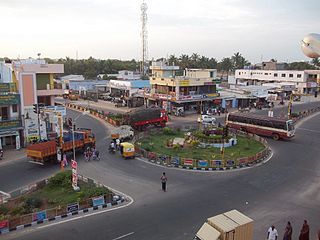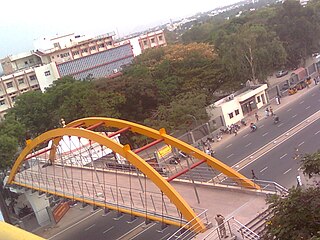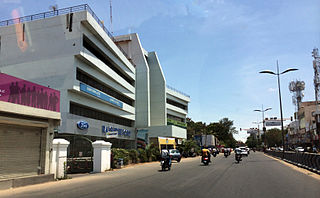
Coimbatore, sometimes shortened as Kovai, is one of the major metropolitan cities in the Indian state of Tamil Nadu. It is located on the banks of the Noyyal River and surrounded by the Western Ghats. Coimbatore is the second largest city in Tamil Nadu after Chennai in terms of population and the 16th largest urban agglomeration in India as per the census 2011. It is the administrative capital of Coimbatore District and is administered by the Coimbatore Municipal Corporation which was established in 1981.

Salem, natively spelt as Selam, is a major city in Salem district, located on the banks of the Thirumanimutharu river in the Indian state of Tamil Nadu surrounded by mountains. Salem is the fifth largest urban agglomeration in the state, exceeded by Chennai, Coimbatore, Madurai, Tiruchirappalli, and Third largest metropolitan region in the state only after to Chennai and Coimbatore metropolitan regions. The city is 124 km2 (48 sq mi) large. Major products of Salem include silver anklets, sago, mangoes, steel, and textiles.

Erode, is a city in the Indian state of Tamil Nadu. It is located on the banks of the Kaveri river and is surrounded by the Western Ghats. Erode is the seventh largest urban agglomeration in Tamil Nadu. It is the administrative capital of Erode district and is administered by the Erode Municipal Corporation which was established in 2008.

Gobichettipalayam is a town and municipality in Erode district of the Indian state of Tamil Nadu. It is the administrative headquarters of Gobichettipalayam taluk. It is situated at the center of the South Indian Peninsula at 213 metres (699 ft) above sea level, surrounded by Western Ghats. It is located 35 kilometres (22 mi) from the district headquarters Erode, 44 kilometres (27 mi) from Tiruppur and 80 kilometres (50 mi) from Coimbatore. Agriculture and textile industries contribute majorly to the economy of the town.

Kongu Nadu, also known as Kongu Mandalam, refers to the geographical region comprising the western and north-western part of the Indian state of Tamil Nadu and in some instances, parts of southeastern Karnataka and eastern Kerala. The region covers an area of roughly 60,895 km2 (23,512 sq mi) with a population of over 27.4 million.

Coimbatore district is one of the 38 districts in the state of Tamil Nadu in India. Coimbatore is the administrative headquarters of the district. It is one of the most industrialized districts and a major textile, industrial, commercial, educational, information technology, healthcare and manufacturing hub of Tamil Nadu. The region is bounded by Tiruppur district in the east, Nilgiris district in the north, Erode district in the northeast, Palakkad district, Idukki district and small parts of Thrissur district and Ernakulam district of neighboring state of Kerala in the west and south respectively. As of 2011, Coimbatore district had a population of 3,458,045 with a sex ratio of 1,000 and literacy rate of 84%.

The Kombai or Polygar dog is a breed of working dog native to Tamil Nadu in Southern India. Traditionally kept for guarding and protection, they have a reputation for making excellent guard dogs. They were also occasionally used for hunting big game.

The Dindigul Fort or Dindigul Malai Kottai and Abirami amman Kalaheswarar Temple was built in 16th-century by Madurai Nayakar Dynasty situated in the town of Dindigul in the state of Tamil Nadu in India. The fort was built by the Madurai Nayakar king Muthu Krishnappa Nayakar in 1605. In the 18th century the fort passed on to Kingdom of Mysore. Later it was occupied by Hyder Ali and Tipu Sultan the fort was of strategic importance. In 1799 it went to the control of the British East India Company during the Polygar Wars. There is an abandoned temple on its peak apart from few cannons sealed with balls inside.These canons are very heavy. In modern times, the fort is maintained by the Archaeological Survey of India and is open to tourists.

Dharapuram is a town situated along the banks of Amaravati River in Tiruppur district in the Indian state of Tamil Nadu. Dharapuram is one of the oldest towns in South India and was the capital of Kongu Nadu under the Cheras, Western Ganga Dynasty and later Kongu Cholas, at which time it was known as Viradapuram. Amaravathi River flows through the town. As of 2011, the town had a population of 67,007. The city houses famous temples including Agatheeswarar Temple, Kaadu Hanumanthasamy temple and many others.

Peelamedu is a major commercial centre and residential locality in the Eastern part of the city of Coimbatore in Tamil Nadu, India. It is governed by Coimbatore City Municipal Corporation since 1981. The growth of Peelamedu during the last decade can be cited due to the growth of the IT sector in Coimbatore. The rapid growth of Peelamedu as a commercial and residential hub could be attributed to its geographical advantage in terms of the connectivity to other parts of the city. It acts as an important hub connecting the rapidly growing business class Information Technology corridor. The Peelamedu area stretches from Nava India to the Coimbatore International Airport near SITRA, encompassing major educational institutions, hospitals, and Industries.

Central Studios was an Indian film studio in the neighbourhood of Singanallur, Coimbatore in Tamil Nadu, started by B.Rangaswamy Naidu and other prominent industrialists like Swamikannu Vincent of Coimbatore in 1935 to make Tamil and other South Indian language movies. The studio was a major hub of Tamil movie production and notable for its association with many early day Tamil Movie Superstars, directors and script writers etc. and many making their career debuts here. The studio is best remembered for movies like Sivakavi, Velaikari and Haridas.
Mopeds India Limited was a two-wheeler manufacturer based in India that produced and marketed the Suvega range of mopeds through technical collaboration with Motobécane of France. Its first model was the Motobécane Mobylette sold under the name Suvega Super 50. It was the first company in India to launch Mopeds in India which was the largest selling two-wheeler segment till 80's and was India's highest-selling moped throughout the early 1980s.

The Madras Presidency was a province of British India comprising most of the present day Tamil Nadu and Andhra Pradesh along with a few districts and taluks of Karnataka, Kerala and Odisha. A few princely states, notably Ramnad and Pudukkottai also merged into the Presidency at some or the other time. The Presidency lasted till 1950, when it became the Madras State after India became a republic. In 1953, Telugu-speaking regions of the state split to form Andhra State. Subsequently, in 1956, Kannada- and Malayalam-speaking areas were merged with Mysore and Travancore-Cochin respectively.
The Trichinopoly district was a district of the erstwhile Madras Presidency of British India. It covered the present-day districts of Tiruchirappalli, Karur, Ariyalur and Perambalur in the Indian state of Tamil Nadu. The administrative headquarters was the town of Trichinopoly, Trichy or Tiruchi, now known as Tiruchirappalli. The district covered an area of 2,632 square miles (6,820 km2) in 1907. It was bound by the districts of South Arcot to the north, Salem to the west, Coimbatore to the west and north-west, Tanjore to the east and Madurai to the south. The princely state of Pudukkottai remained within the jurisdiction of Trichinopoly district from 1865 to 1947.
Economy of Coimbatore is heavily influenced by information technology, engineering and textiles. Coimbatore is called the Manchester of South India due to its extensive textile industry, and IT industry, small and medium scale enterprises. The GDP of Coimbatore is around $45 billion (2021). It is second largest city by GDP in Tamil Nadu. The city has four special economic zones [SEZ], ELCOT SEZ, KGISL SEZ, SPAN Venture SEZ, Aspen SEZ and at least five more SEZs are in the pipeline. In 2010, Coimbatore ranked 15th in the list of most competitive Indian cities.

Karur was built on the banks of River Amaravathi which was called Aanporunai during the Sangam days. The names of the early Chera kings who ruled from Karur, have been found in the rock inscriptions in Aru Nattar Malai close to Karur. The Tamil epic Silapathikaram mentions that the famous Chera King Senguttuvan ruled from Karur. The ancient Greek scholar Ptolemy is said to have known Karur by the name Korevera or Kāroura, placing it as a major trading centre in the region

Avinashi Road, is an arterial road in Coimbatore, India. Running from west to east, the road starts at Uppilipalayam flyover and ends at Neelambur by-pass junction where it joins NH 544, Beyond Neelambur Junction, the road branches into two, with one traversing southwards to Madukarai to form the Coimbatore bypass while the other continues westwards to Avinashi and beyond to form the National Highway 544. This road connects Coimbatore to its airport and the east and north-east suburbs. The road was an indicator of development as the city of Coimbatore grew up mostly along its eastern and western sides.

Tiruppur or Tirupur ( ), is a city in the Indian state of Tamil Nadu. It is located on the banks of the Noyyal river and is the fourth largest urban agglomeration in Tamil Nadu. It is the administrative capital of Tiruppur district and is administered by the Tiruppur Municipal Corporation which was established in 2008.

This is a timeline list of major events in the history of Coimbatore, a major city in the Indian state of Tamil Nadu.



















